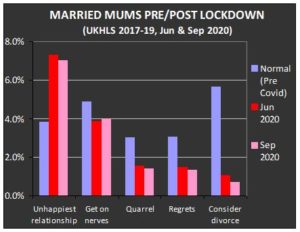OUR latest analysis of survey data from September shows that those seriously considering divorce are still well down on pre-COVID levels.

- Several articles in the media have anticipated a post-lockdown ‘divorce boom’ on the basis of online enquiries and google searches.
- We have previously published analysis of June survey data from UK Household Longitudinal Study revealing twice as many marriages had improved rather than deteriorated during lockdown #1. Moreover the proportion of parents actively considering divorce was down by two thirds on pre-COVID levels (Benson & McKay 2020).
- This new analysis of September survey data from UKLHS on 3,005 parents shows little change in couple relationship indicators – relationship happiness, frequency of getting on each other’s nerves and quarrels, regrets about marriage, and couples actively considering divorce.
- In other words, up until September, there was no sign whatsoever of a pending ‘divorce boom’ as regards those saying they were considering divorce.
- This is supported by Ministry of Justice data showing a fall in the number of divorce petitions during the third quarter of 2020.
- As we have highlighted previously, cohabiting mothers struggled most during lockdown, with 22% saying their relationship had got worse compared to 7% of married mothers, 6% of cohabiting and 11% of married fathers. They were also more likely than married parents to be unhappy, get on nerves or quarrel often.
- Our updated analysis shows that this situation had remained largely unchanged in September.
- Although stress levels in parental relationships were apparent in June and September, lockdown appears to have affirmed the commitment of married parents and exposed the insecurity faced especially by a significant proportion of cohabiting mothers.
